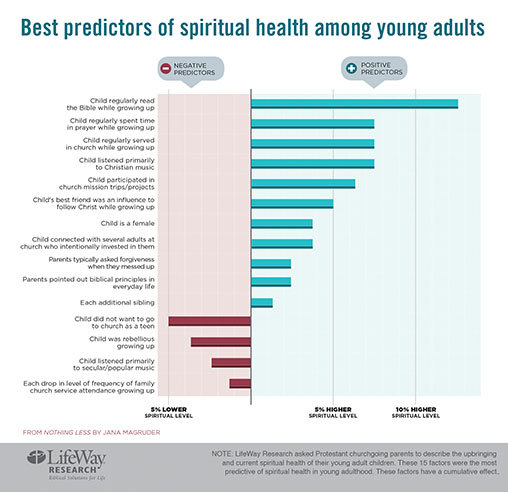 Sometimes research can surprise you with its results. Other times it doesn't.
Sometimes research can surprise you with its results. Other times it doesn't.
In a recent survey, LifeWay Research asked 2,000 Protestant and nondenominational churchgoing adults questions related to their children's spiritual health. All participants attended church at least once a month. All had children – 3,472 in all – between the ages of 18 and 30.
The results confirm that just attending church isn't enough when it comes to children growing into spiritually healthy adults.
Reading the Bible, no surprise, shows the most impact in guiding a child to become a faithful member of a church as an adult. That process of Bible literacy comes early, says Maria Brannen, state missionary in Kids Groups and Faith Development of the Georgia Baptist Mission Board.
"As a mom and a kid’s ministry leader, I think kids should begin the process of personally reading the Bible on their own as early as they are developing reading skills to be able to do so," she attests. "God’s Word – the Bible – is the most important book they will ever read. It's life changing. It just makes sense that they start reading it early in life and use it to build their life’s foundation."
LifeWay's approach in the study came from two avenues. First, parents were asked about 40 factors capable of impacting a child's spiritual development such as divorce, schools, and church attendance. Next, parents scored their children on eight observable characteristics ranging from "Identifies as a Christian" to "Reads the Bible regularly" and "Serves in the Community." Each "yes" earned one point, for eight total possible points.
Half of respondents scored a 1 or 0. At minimum, they identified as a Christian. Only three percent scored an 8.
The strongest correlation of children growing up to spiritually active and healthy pointed to reading Scripture. Twenty-nine percent of the young adults, according to the parents' responses, ready their Bible regularly while growing up. That section tested out 12.5 percent higher on the study's spiritual health score, according to LifeWay.
Merely expecting their child to become a Bible-reader isn't a good approach, Brannen says. "Each family's plan will be unique to their kids and their family. It includes stages of reading the Bible to your child, reading the Bible with your child, and your child reading the Bible on their own.
"Some of these stages will overlay each other, happening simultaneously. Lifeway’s Bible Skills for kids recommends that around 1st-3rd grades kids begin to use the Bible for daily Bible reading. Older kids – 4th-6th graders – should be establishing the discipline of daily Bible reading."
LifeWay Kids director Jana Magruder, author of Nothing Less: Engaging Kids in a Lifetime of Faith, said parents overlooking such a key – yet simplistic – part of a child's discipleship is easy. The study itself was sponsored by LifeWay Kids to be used alongside Nothing Less.
Brannen has overseen the Georgia Baptist Mission Board's Bible Drill for children and youth for more than 20 years. As a parent, state missionary, and former participant she can testify to the long-lasting impact of reading and memorizing Scripture from an early age. Involved with Bible Drill as a child herself, her sons have also taken part. Her 16-year-old will be in Bible Drill his ninth time this year.
Establishing a family culture of reading the Bible may seem difficult, but Brannen gives the following suggestions:
While Brannen doesn't feel there's a formula guaranteed to get kids to read their Bible, she advocated for the biggest influence in a child's life, his or her parents.
"Kids need to see their parents reading their Bible. It needs to be modeled for and with the children. Avoid just verbally encouraging them."
The LifeWay study revealed parents' impact on their children's spiritual growth. Greater spiritual health scores became possible if parents ...
What children see, they imitate. That recognition has, in part, spurred Kids Groups and Faith Development to launch a new strategy. Four initiatives will aim at helping churches and families raise biblical literacy rates and Bible skills.
"It's not a program," Brannen explains. "It's an intentional strategy."
Goals include making sure every child has a Bible that contains the Old and New Testament and all kids in a children's ministry reads an entire book of the Bible. Also, children should learn at least ten Scripture verses as well as the names, in order, of all 665 books of the Bible.
"This isn't event-driven, but meant to attack Bible illiteracy," she adds. "It's something every church should be doing."